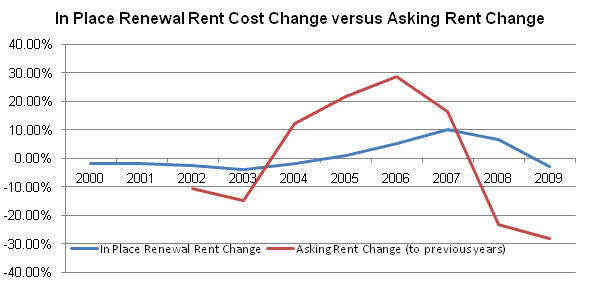Kenzo Japan Real Estate

Flavor of the Month
Office Market Tokyo: “In-Place Rent compared to Asking Rent developments”
The chart below shows the development of Asking Rents for new or vacant office space for class A office in Tokyo CBD 5 in comparison to the development of Traditional Rent Renewals in Tokyo.
I am showing this picture because in my discussions with foreign investors I am constantly being challenged with the general desire for long term fixed leases which despite of the tenancy law revision in 2000 is barely common in the office sector.
Investors are very familiar with the development of the Asking Rent development and its volatility over the years and new foreign investors consequently expect that they are exposed to this volatility with every renewal date of the traditional lease they have in place with existing tenants in their potential investments.
The below chart confirms that this assumption is far away from reality. While asking rent shows very substantial year on year changes the renewal level changes only moderately:
- In Dec. End 2006 Asking Rents for vacant space were 28.5% over 2005 level and in Dec. 2007 Asking Rents were up another 16.3% over Dec 2006.
- At the same time Rent Renewal levels in 2006 were 5% higher than the formally agreed rent (usually 2 years before, meaning 5% higher than the rent agreed in 2004), in 2007 the level of rents agreed at renewal was 10% higher than the formally agree rent in 2005.
- While in Dec. 2008 the vacant space Asking Rent was 23.3% lower than that of Dec. 2007, the level at which rent contracts have been renewed in 2008 was still 6.5% over their former level, agreed in 2006.
Since it is the business of a developer to constantly produce and offer new space to the market, it is his task to manage this exposed to the developments of Asking Rents.
Different from a developer a core real estate investor buys an occupied stabilized office following careful due diligence on quality and competitiveness. Thereafter his task is to ensure a ongoing professional quality and tenant management and thereby limit his rent income risk exposure to very moderate rent renewal changes. The fact that he will have mainly traditional short term leases in place will provide him with opportunities to recover soon (2 years) in case he had to give us some rent income at a time of a difficult leasing market.

Source: CB Richard Ellis Research Institute K.K., quarterly office market report Asia, hand out real estate seminar, Tokyo, June 2010
© 2025 Kenzo Capital Corporation
design by Connect Inc. Tokyo